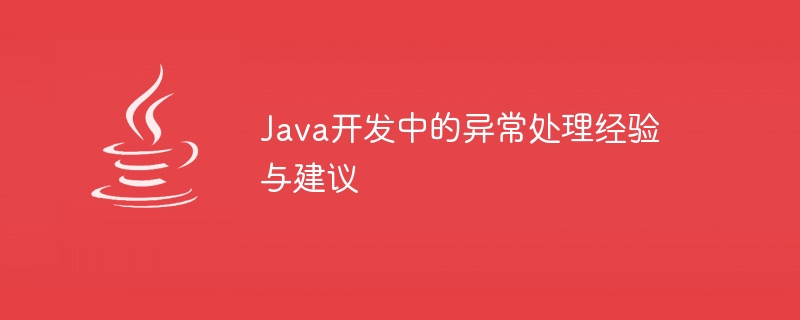

As a popular programming language, Java exception handling plays a very important role in development. Good exception handling can improve the robustness and maintainability of the program, and can also improve the user experience. This article will discuss exception handling experiences and suggestions in Java development.
In Java, an exception is a special situation during the running process of the program. It can be an error or unexpected event. Exception handling is a program behavior that handles exceptions and allows the program to continue executing. Java provides an exception handling mechanism through the try-catch block to catch and handle exceptions, and the throw and throws keywords to throw exceptions.
In exception handling, it is very important to choose the appropriate exception type. Exceptions in Java are divided into checked exceptions and unchecked exceptions. Checked exceptions are exceptions that must be handled at compile time, while unchecked exceptions are exceptions that occur at runtime. When using custom exceptions, you can inherit the Exception class or the RuntimeException class, depending on the exception handling requirements.
For unpredictable situations, use unchecked exceptions, such as NullPointerException, IndexOutOfBoundsException, etc.; for checked exceptions, such as file reading exceptions, network connection exceptions, etc., they should be handled clearly and use try-catch block to catch exceptions and handle them, or pass exceptions to the upper layer through the throws keyword declaration.
In actual Java development, a unified exception handling mechanism can improve the maintainability of the code. You can catch uncaught exceptions by defining a global exception handler, then record the exception information in the log and display a friendly error page to the user. This can prevent exceptions from being unhandled and cause the program to crash, and it can also help troubleshoot and fix problems.
In exception handling, there are some best practices that can help developers write more robust and reliable code:
When handling exceptions, there are some design principles that can be followed:
Good exception handling not only includes catching and handling exceptions, but also recording and troubleshooting of exceptions. By recording exception stack information and context information, developers can help developers locate and resolve exceptions faster.
In Java development, exception handling is a very important task. Good exception handling can improve the robustness and maintainability of the program. Choosing appropriate exception types, unified exception handling mechanisms, following best practices and design principles, and recording and troubleshooting exceptions are all key to ensuring good exception handling. I hope that the exception handling experiences and suggestions discussed in this article can help Java developers write more stable and high-quality code.
The above is the detailed content of Exception handling experience and suggestions in Java development. For more information, please follow other related articles on the PHP Chinese website!




